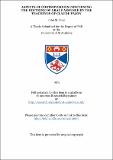Aspects of controversies concerning the doctrine of grace aroused by the teachings of Claude Pajon
Abstract
John Cameron highly influenced the development of theology at the Huguenot Academy of Saumur and left an impact on French Reformed thought that continued to the end of the Seventeenth Century. Cameron had modified orthodox Calvinism by softening some of its harsher features in order to answer its opponents more effectively. Claude Pajon was convinced that certain flaws had emerged in the way other disciples of Cameron were interpreting his theology which threatened to undermine Cameron's carefully balanced system. Cameron had introduced the concept that the will always follows the understanding and that man is converted according to his nature through persuasion and reasons without any coercion. Man was understood as possessing natural ability to choose the good; however because of his own voluntary choice, he remains in the grip of a moral inability. He also taught the controversial concept of "hypothetical universalism" or that God wills the conversion of all men and provides the Word for their redemption which is an adequate remedy for man's sinful condition. In the end, however, only those granted a particular grace are actually of the elect and converted. Pajon vigorously opposed those who argued that there is a need for an immediate act of grace distinct from the action of the Word before man's mind could be illuminated. To argue that grace is universal and that the Word is an adequate remedy for sin and still to insist on an immediate grace of this nature was considered by Pajon to rob the concept of universalism of any validity, and to undermine the entire Cameronian apologetic. Pajon's solution was to propose a method of conversion known as mediate grace or congruism. The Spirit brings about conversion entirely by the secondary means of the Word and its attending circumstances and causes all these influences to converge in such a way and at such a time that the subject is inevitably but voluntarily persuaded and converted. It is essential to the very nature of man to be able to receive the Word of truth which brings deliverance to the soul without immediate grace. Furthermore, man's sin is of a moral nature; nothing physical is involved in it in any way. Therefore, the logical prescription should be a moral remedy for a moral malady. Pajon understood that his concept of grace represented Cameron's own position and was the most coherent interpretation of Cameronianism.
Type
Thesis, PhD Doctor of Philosophy
Collections
Items in the St Andrews Research Repository are protected by copyright, with all rights reserved, unless otherwise indicated.

